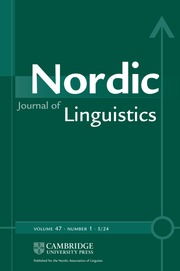Article contents
Linguistic Meaning: Cognition, Interaction and the Real World1
Published online by Cambridge University Press: 22 December 2008
Abstract
This article deals with the basic issues of the nature of linguistic meaning and the place of semantics in linguistic theory. First, there is a discussion of the implications for semantics of the research paradigm based on formal simulation, concluding that it involves a risk of misrepresenting the place of semantics in linguistics. Second, there is a discussion of the truth-conditional approach, which, although in one important respect it involves a more adequate conception of the role of semantics in language theory, is seen as misrepresenting linguistic meaning in a way that has been pointed out within the cognitive approach to semantics. Third, however, it is argued that the cognitive approach does not sufficiently account for the external anchoring of meaning. Fourth, it is argued that meaning ‘outside the head’ must be understood as basically interactive. A crucial element in the view argued here is the distinction between linguistic, potential meaning, which functions as instructions to the addressee, and actual meaning or ‘message’, which the addressee works out as part of the actual process of interpretation. Within such a picture, the importance of both cognition and truth can be accounted for, and both aspects are seen as dependent on the fundamental embeddedness of language in a shared social universe.
- Type
- Research Article
- Information
- Copyright
- Copyright © Cambridge University Press 1991
References
REFERENCES
- 2
- Cited by


